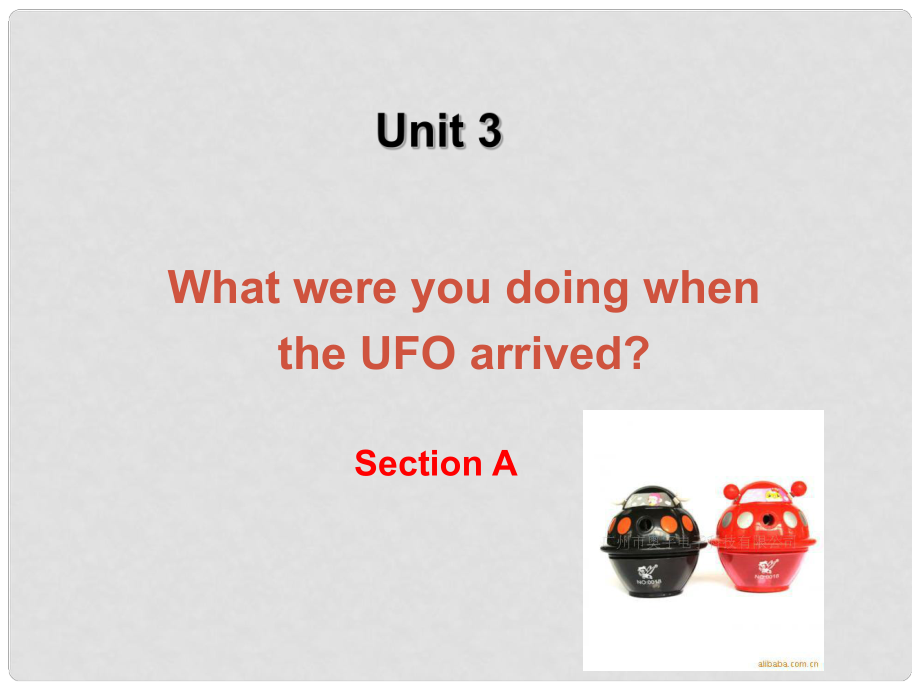《湖北省十堰市東風(fēng)四中八年級(jí)英語(yǔ)上冊(cè) Unit 3 What were you doing when the UFO arrived Section A2課件 人教新目標(biāo)版》由會(huì)員分享�,可在線閱讀,更多相關(guān)《湖北省十堰市東風(fēng)四中八年級(jí)英語(yǔ)上冊(cè) Unit 3 What were you doing when the UFO arrived Section A2課件 人教新目標(biāo)版(24頁(yè)珍藏版)》請(qǐng)?jiān)谘b配圖網(wǎng)上搜索����。
1�、What were you doing when the UFO arrived?Section AWhy does the alien come to the earth?DO SOME RESEARCHTRAVEL do some shopping Read the message, find out what the alien did, and number the following pictures in correct order. 3A READING 3 1452DISCUSS When I see a alien, I may (be) .get scared and ru
2、n awayyou the alienfollow him (her)talk with him (her)LANGUAGE POINTexperience n. I had a very unusual experience on Sunday. 星期天我有一次很不尋常的經(jīng)歷�����。星期天我有一次很不尋常的經(jīng)歷����。 He has many interesting experiences in his life. 他一生中有許多有趣的經(jīng)歷。他一生中有許多有趣的經(jīng)歷�。 She has years of experience in teaching. 她有多年的教學(xué)經(jīng)驗(yàn)。她有多年的教學(xué)經(jīng)驗(yàn)��?!就卣雇卣埂縠
3���、xperience作動(dòng)詞作動(dòng)詞 Young people need to experience different things. 年輕人需要經(jīng)歷不同的事情。年輕人需要經(jīng)歷不同的事情�。experience作名詞有作名詞有“經(jīng)歷;經(jīng)驗(yàn)經(jīng)歷���;經(jīng)驗(yàn)”的意的意思�。作思�。作“經(jīng)歷經(jīng)歷”講時(shí)是講時(shí)是_名詞;名詞�����;作作“經(jīng)驗(yàn)經(jīng)驗(yàn)”講時(shí)是講時(shí)是_名詞�����。名詞���。experience還可以作還可以作_, 意思是意思是經(jīng)歷經(jīng)歷�����?�?蓴?shù)不可數(shù)動(dòng)詞總結(jié):總結(jié):l You can imagine how strange it was! how strange it was ! 是一個(gè)感嘆句是一個(gè)感嘆句�����, “這事多么令人驚奇啊
4��、����!這事多么令人驚奇啊��!” 是由是由how引導(dǎo)的感嘆句��,引導(dǎo)的感嘆句�, 其構(gòu)成為其構(gòu)成為: How + 形容詞或副詞形容詞或副詞 +主語(yǔ)主語(yǔ) + 謂語(yǔ)�����!謂語(yǔ)�����! How cold it is today! 今天多冷??���!今天多冷?����?��! How beautiful the flower is! 多么美麗的花?�?���!多么美麗的花?��?! How heavily it is raining ! 雨下得多大?����?�!雨下得多大?���?�!YOUR OWN SENTENCES1. How tall she is! 她個(gè)子多高?�?���!她個(gè)子多高?。?. How well George writes! 喬治寫(xiě)得多好?����?����!喬治寫(xiě)得多好?�?����!拓展W
5����、hat + (a/an) + 形容詞形容詞 +名詞名詞 + 主語(yǔ)主語(yǔ) +謂語(yǔ)謂語(yǔ)What wonderful ideas we have!What cold weather it is!感嘆句的省略形式為:感嘆句的省略形式為:What a clever boy (he is) !Your own sentences:What beautiful flowers those are!那些花多漂亮啊����!那些花多漂亮啊����!1)_ food youve cooked! A. How a nice B. What a nice C. How nice D. What nice 2)_terrible wea
6、ther weve been having these days! A. What B. What a C. How D. How a 3) - _ I had! - You really suffered a lot. A. What a time B. What time C. How a time D. how timeEXERCISE get out The girl was shopping when she saw the alien get out. 當(dāng)那個(gè)女孩看見(jiàn)外星人出來(lái)時(shí)當(dāng)那個(gè)女孩看見(jiàn)外星人出來(lái)時(shí), 她正在購(gòu)物����。她正在購(gòu)物。 The dog got out of the b
7�����、ox and ran away. 那只狗從箱子里出來(lái)那只狗從箱子里出來(lái),跑走了�。跑走了。 The woman got out of the car and went into the bank. 那位婦女從車?yán)锍鰜?lái)那位婦女從車?yán)锍鰜?lái), 進(jìn)了銀行�。進(jìn)了銀行。MORE EXPRESSIONS OF “GET”get on / off 上上 / 下車下車get up 起床起床get back 回來(lái)回來(lái)get on / along with 與與相處相處be surprised to do sth. 對(duì)做對(duì)做感到吃驚感到吃驚 be surprised at 對(duì)對(duì)感到吃驚感到吃驚 I was surpr
8����、ised to meet you here. We were surprised at the news.surprising 令人驚訝的令人驚訝的 The surprising answer is yes.Exercise:Fill in the blanks by using the proper forms of “surprising” and “surprised”. We _ hear the _ news.are surprised tosurprisingexcited 興奮的興奮的 be excited at 對(duì)對(duì)感到興奮感到興奮 I was very excited at
9��、the thought that in another week Ill be with you again on holiday.exciting:令人興奮的令人興奮的 This has been an exciting week.Exercise:Fill in the blanks by using the proper forms of “excited” and “exciting”. We _ at the _ news.are excited excitingbefore conj. 在在之前之前 Before I came home, my mother cooked dinner. He finished his homework before he went to sleep. HOMEWORKFinish off the other exercises in Section A.
 湖北省十堰市東風(fēng)四中八年級(jí)英語(yǔ)上冊(cè) Unit 3 What were you doing when the UFO arrived Section A2課件 人教新目標(biāo)版
湖北省十堰市東風(fēng)四中八年級(jí)英語(yǔ)上冊(cè) Unit 3 What were you doing when the UFO arrived Section A2課件 人教新目標(biāo)版

